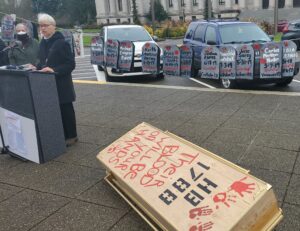Pushback on police accountability laws
In 2010, John T. Williams, a 7th generation Nuu-chah-nulth Elder and woodcarver, was walking near downtown Seattle with a closed wood-carving knife. A police officer yelled from his car to get his attention but, because he was hearing impaired, Williams did not respond. Seven seconds later, Williams lay dead in the street.

The officer, Ian Birk, resigned but no charges were ultimately filed against him. As King County prosecuting attorney, Dan Satterberg, told Seattle Met magazine last year, Birk “… brought all of the risk to a situation that didn’t require any intervention at all.”
Renee Davis was a pregnant, 23-year old Muckleshoot woman. She was a survivor of domestic violence and a mother of three with a history of depression. When she threatened suicide, her partner called the sheriff’s office for assistance. When a King County deputy entered her residence on tribal land to do a welfare check, Davis was in bed. Within a minute of the deputy’s arrival, Davis was dead.
Outrage over civilian deaths at the hands of police was further sparked by nationwide coverage of lethal police actions in the cases of George Floyd, Breonna Taylor, Elijiah McClain, Daunte Wright and others. This helped propel legislation in 2020 that increased police accountability in Washington state.
But now that protests over police killings have dwindled and public attention has shifted to other concerns, some legislators in Washington State want to roll back two laws that put some constraints on police actions linked to fatal outcomes. HB 1310 revised standards for the use of physical force, requiring officers to assess situational context, such as pre-existing mental health conditions or the presence of children at the scene. HB 1054 banned law enforcement from using chokeholds, neck restraints, no-knock warrants and some military gear. Wording regarding the use of tear gas was especially controversial. The final version of the legislation allows for use of teargas in certain situations.
The Washington Coalition for Police Accountability says two recent bills introduced in the House would erase the hard-fought gains of HB 1310 and HB 1054. Returning more freedom to police, they warn, will mean more people of color will be killed by police—more dead bodies on the streets, more motherless and fatherless children.
At a recent rally to bring attention to the proposed legislation, Coalition spokespeople said statistics on racial profiling confirm that police often target people of color, pursuing them in vehicular chases for minor infractions which may or may not be justified.
Many vehicular encounters, they say, end in death for people of color and in some cases, harm bystanders as well. They oppose HB 1788, which states an officer can engage in a deadly vehicular pursuit if there is “reasonable suspicion a person in the vehicle has committed or is committing a criminal offense, and the safety risks of failing to apprehend or identify the person are considered to be greater than the safety risks of the vehicular pursuit under the circumstances.” HB 1788 has not progressed past introduction in the House as of this writing.
HB 2037, which the Coalition also opposes, would allow police officers to use force if they feel they are in immediate danger—a “shoot first, ask questions later” approach. The Coalition says this stance is standard operating procedure for law enforcement personnel across the country. In part it reflects training termed “Killology,” a program taught by retired Army ranger Dave Grossman. The Killology website states it focuses on “the reactions of healthy people in killing circumstances (such as police and military in combat) and the factors that enable and restrain killing in these situations.”
Detractors of Grossman’s approach say it is essentially the same behavior exhibited by former police officer Derek Chauvin when cameras captured the murder of George Floyd. HB 2037 has passed the house and was scheduled for executive session on February 24, 2022.
Two other bills introduced in the last session have passed the House and now move to the Senate: HB 1719, which addresses the use and acquisition of military equipment by law enforcement agencies, and HB 1735, which would modify the standard for use of force by peace officers.
Among other provisions, HB 1719 would allow for larger caliber, “non-lethal” rounds to be approved for firing. HB 1735 would allow police to take a suspect by force to a mental health institution if deemed unwell by the officer.
M. Enfield is a local writer and activist.
Be First to Comment